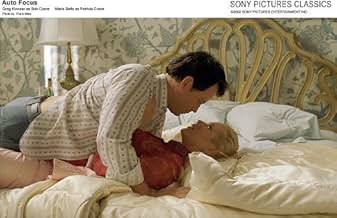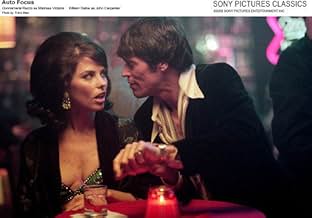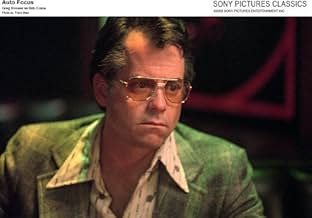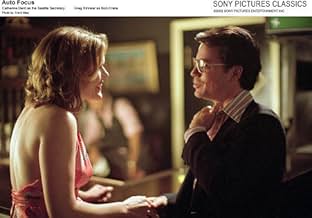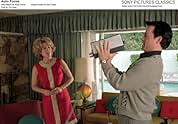The life of TV star Bob Crane and his strange friendship with electronics expert John Henry Carpenter.The life of TV star Bob Crane and his strange friendship with electronics expert John Henry Carpenter.The life of TV star Bob Crane and his strange friendship with electronics expert John Henry Carpenter.
- Awards
- 6 nominations total
Michael E. Rodgers
- Richard Dawson
- (as Michael Rodgers)
DonnaMarie Recco
- Melissa
- (as Donnamarie Recco)
- …
- Director
- Writers
- All cast & crew
- Production, box office & more at IMDbPro
Featured reviews
After a while, I really did get more of what director Paul Schrader was aiming for with Auto Focus, the tale of males caught in some sort of odd damnation of both free will and morality. It's more like a drug movie, only here the drug being the opposite sex, and almost a singularly male ego-trip, instead of common narcotics. But it's also a very fine character study where the idea of character is taken into consideration, of how much one can seem a certain way, but then be stuck in with flaws and insecurities and, ultimately, temptation. The last of which is what Schrader puts into focus early on, but then after a while when temptation is gone, the film becomes a direct plunge into complete debauchery. And appropriately, like with all addicts, for a while nothing seems wrong at all about all of this.
Greg Kinnear is definitely in one of his best parts here, as he plays someone who is an actor who keeps his actor-like charms off the set as well. In Hollywood, away from the confines of Connecticut, his Bob Crane lands the lead on Hogan's heroes, but can't resist the first temptations of the night-life. This comes, in an introductory way and then throughout as a tag-along/counterpart, with John Carpenter (not the director, played with the best match by Willem Dafoe of being a creep and alluring at times), who shows him the ropes and hooks him up with video equipment. But as Crane goes deeper into his sexual drives, divorces, marries again and divorces again, his acting career and his livelihood seem to slip away. The themes of being perversely the 'All-American Male' are accentuated by Kinnear's Crane in voice-over as he talks about the unbridled joys of sex, and in an interview with a Christian publication he says 'I don't...make waves'. By the last third of his story, however, into the rot of the 70s, he's lost touch with the reality of his pleasures- or rather necessities.
Auto Focus isn't at times an easy movie to sit through; it's even cringe-worthy in a couple of scenes (notably for me was when he guest stars on a celebrity cooking show, only to keep on his sexually-driven side with audience members). Then there are other scenes (i.e. 'you have fingers up you-know-where', and the genital enhancement) where male masculinity is questioned, and in very peculiar ways between Crane and Carpenter; Crane is homophobic, but then what exactly is Carpenter's function? More than anything, less than being a friend, he becomes a kind of unintentional pusher, where the draw of going out on the town becomes a crux for both of the men. What's just as fascinating then is how Schrader aligns this with his style- the first half is mostly very slick and professional-looking, almost like an HBO bio-pic or something. But then as the characters lose a grip on everything except themselves, there's a hand-held, distorted view to everything. There's lots of nudity and on-screen sex (some blurred out, likely by MPAA request), yet Schrader gets something more shocking, in the mind at least, as Carpenter almost becomes the antagonist in a way as the story winds down (the last phone call marks this most).
Auto Focus has the ideal of the usual biographical drama of a somebody in Hollywood who soon loses himself to becoming a nobody, but there's plenty under the surface that makes it more intriguing. Crane's two sides to his persona- the celebrity one, and the personal 'lifestyle' one- become one and the same after a while, Kinnear being able to make such a near-irredeemable person somewhat sympathetic (or at the least very watchable). And Carpenter's more truthful, emotional, and scary turn is made palatable by Dafoe's equally nuanced performance. It's not great, but it's a near-classic of the tale-of-such-and-such-star when so many don't take in what's deeper into account. A-
Greg Kinnear is definitely in one of his best parts here, as he plays someone who is an actor who keeps his actor-like charms off the set as well. In Hollywood, away from the confines of Connecticut, his Bob Crane lands the lead on Hogan's heroes, but can't resist the first temptations of the night-life. This comes, in an introductory way and then throughout as a tag-along/counterpart, with John Carpenter (not the director, played with the best match by Willem Dafoe of being a creep and alluring at times), who shows him the ropes and hooks him up with video equipment. But as Crane goes deeper into his sexual drives, divorces, marries again and divorces again, his acting career and his livelihood seem to slip away. The themes of being perversely the 'All-American Male' are accentuated by Kinnear's Crane in voice-over as he talks about the unbridled joys of sex, and in an interview with a Christian publication he says 'I don't...make waves'. By the last third of his story, however, into the rot of the 70s, he's lost touch with the reality of his pleasures- or rather necessities.
Auto Focus isn't at times an easy movie to sit through; it's even cringe-worthy in a couple of scenes (notably for me was when he guest stars on a celebrity cooking show, only to keep on his sexually-driven side with audience members). Then there are other scenes (i.e. 'you have fingers up you-know-where', and the genital enhancement) where male masculinity is questioned, and in very peculiar ways between Crane and Carpenter; Crane is homophobic, but then what exactly is Carpenter's function? More than anything, less than being a friend, he becomes a kind of unintentional pusher, where the draw of going out on the town becomes a crux for both of the men. What's just as fascinating then is how Schrader aligns this with his style- the first half is mostly very slick and professional-looking, almost like an HBO bio-pic or something. But then as the characters lose a grip on everything except themselves, there's a hand-held, distorted view to everything. There's lots of nudity and on-screen sex (some blurred out, likely by MPAA request), yet Schrader gets something more shocking, in the mind at least, as Carpenter almost becomes the antagonist in a way as the story winds down (the last phone call marks this most).
Auto Focus has the ideal of the usual biographical drama of a somebody in Hollywood who soon loses himself to becoming a nobody, but there's plenty under the surface that makes it more intriguing. Crane's two sides to his persona- the celebrity one, and the personal 'lifestyle' one- become one and the same after a while, Kinnear being able to make such a near-irredeemable person somewhat sympathetic (or at the least very watchable). And Carpenter's more truthful, emotional, and scary turn is made palatable by Dafoe's equally nuanced performance. It's not great, but it's a near-classic of the tale-of-such-and-such-star when so many don't take in what's deeper into account. A-
This is a movie about a man's downfall; in this case, sex. I saw this right after 'Requiem for a Dream'(I guess I was in an addictive mood). This is a sad movie, but not on par with 'Requiem'. I never knew the sordid details about 'Col. Hogan', but this movie laid it out for me. The acting is very good. As other's viewers have noticed, the cinematography and music matches the decline of Crane's life. I was very depressed near the end. There is an obvious implication of his friend Carpenter in his murder, and outside of a court of law, many people would believe it. It's like a weak Oliver Stone/JFK, but still believable. Kind of like a required homework assignment that they may never get credit for, yet execute at 100 percent and show their merit. It wasn't a box office movie, but I believe it's worth watching, and it is exemplarary work by the actors. Maybe it needed more supporting character development, maybe longer screen shots.
A cautionary tale of the dangers of sexual addiction, `Auto Focus' shows what can happen when a person attempts to lead a double life in this case, a straight-laced family man by day and a pornography-obsessed playboy by night. In `Auto Focus,' the family man/pornographer turns out to be none other than the well-known actor Bob Crane, the star of TV's `Hogan's Heroes,' who was found murdered in a Scottsdale, Arizona hotel room in 1978 under mysterious and sensational circumstances that included the uncovering of tapes Crane had made of his own sexual experiences. The general public was shocked to discover that a man they had invited into their living rooms every week for six years had been living such an unsavory parallel existence though those who knew him well were apparently far less shocked by the revelation. Drawing on Robert Graysmith's book `The Murder of Bob Crane' for its inspiration and viewpoint, the film, written by Michael Gerbosi and directed by Paul Schrader, chronicles the rise and fall of this handsome actor, from his days as a successful LA disc jockey and his meteoric rise to fame as star of a hit comedy series, to his growing obsession with promiscuity and pornography, which led to the disintegration of both his personal and professional life - and, ultimately, to his death, most likely at the hands of his buddy-in-sleaze, videographer John Carpenter (though he was never convicted of the murder).
`Auto Focus' certainly does not shy away from revealing many of the salacious details of this true-life story. Schrader deals head-on with the disturbing nature of a mind so all consumed with the subject of sex that all other aspects of life become obliterated and distorted. What's fascinating about Crane at least in the way he is depicted in this film is that he seems to have had some sort of self-destructive death wish, for not only does he risk his career by sleeping with countless women, but he insists on leaving behind the evidence by videotaping many of his encounters, and then flaunting his `accomplishments' to others in the Hollywood community. In a way, such a cavalier attitude only underlines the sickness at the core of Crane's soul which in a perverse, paradoxical way, actually makes Crane a more sympathetic figure than he otherwise might be. An enormous amount of credit for this also goes to Greg Kinnear who does a superb job of not only replicating Crane's style of acting but of showing us the tortured man Crane became in his later years. He was truly a man driven to madness by the demons within him, and we can all identify in some sense with that condition (our demons may not be sexual in nature, but they probably eat away at us just as ravenously as they did Crane). Kinnear gets outstanding support from Willem Dafoe as Carpenter, the Svengali-like figure who lures Crane into his world of photographed sex, and Ron Leibman, as Crane's well-meaning, caring agent who can do little but stand by helplessly as his client throws his career and his life away to feed this devouring passion.
The filmmakers have done an amazing job capturing the sights and sounds of the era in which the film is set. Especially impressive are the scenes recreating `Hogan's Heroes,' with Kurt Fuller, in particular, a standout as Werner Klemperer (Colonel Klink). It's also fascinating to see the evolution of videotape technology as portrayed in the film. How many of us knew that such equipment existed for home consumption as early as the mid-60's?
There's a real sadness to the final stretches of the film, made all the more poignant by having the dirge-like musical score run uninterrupted under the action. The effect is that we really get a sense of the total desolation of Crane's life at that point as he has lost his family, his career, and his self-respect to the master he chose early on to serve. The loss of his life seems almost de rigueur given all that has gone before. `Auto Focus' is not always an easy film to watch, but for its unflinching look at an often-unappetizing subject, it deserves to be seen.
`Auto Focus' certainly does not shy away from revealing many of the salacious details of this true-life story. Schrader deals head-on with the disturbing nature of a mind so all consumed with the subject of sex that all other aspects of life become obliterated and distorted. What's fascinating about Crane at least in the way he is depicted in this film is that he seems to have had some sort of self-destructive death wish, for not only does he risk his career by sleeping with countless women, but he insists on leaving behind the evidence by videotaping many of his encounters, and then flaunting his `accomplishments' to others in the Hollywood community. In a way, such a cavalier attitude only underlines the sickness at the core of Crane's soul which in a perverse, paradoxical way, actually makes Crane a more sympathetic figure than he otherwise might be. An enormous amount of credit for this also goes to Greg Kinnear who does a superb job of not only replicating Crane's style of acting but of showing us the tortured man Crane became in his later years. He was truly a man driven to madness by the demons within him, and we can all identify in some sense with that condition (our demons may not be sexual in nature, but they probably eat away at us just as ravenously as they did Crane). Kinnear gets outstanding support from Willem Dafoe as Carpenter, the Svengali-like figure who lures Crane into his world of photographed sex, and Ron Leibman, as Crane's well-meaning, caring agent who can do little but stand by helplessly as his client throws his career and his life away to feed this devouring passion.
The filmmakers have done an amazing job capturing the sights and sounds of the era in which the film is set. Especially impressive are the scenes recreating `Hogan's Heroes,' with Kurt Fuller, in particular, a standout as Werner Klemperer (Colonel Klink). It's also fascinating to see the evolution of videotape technology as portrayed in the film. How many of us knew that such equipment existed for home consumption as early as the mid-60's?
There's a real sadness to the final stretches of the film, made all the more poignant by having the dirge-like musical score run uninterrupted under the action. The effect is that we really get a sense of the total desolation of Crane's life at that point as he has lost his family, his career, and his self-respect to the master he chose early on to serve. The loss of his life seems almost de rigueur given all that has gone before. `Auto Focus' is not always an easy film to watch, but for its unflinching look at an often-unappetizing subject, it deserves to be seen.
Bob Crane's life is the subject of Auto Focus from 2002.
A popular star of the hit series Hogan's Heroes, Crane was a sex addict who enjoyed videotaping his sexual encounters. His partner in this endeavor was video expert John Carpenter.
Crane was murdered while doing dinner theater in Arizona. John Carpenter was a suspect in the murder, as were others. Carpenter was ultimately brought to trial and acquitted. The crime scene had been sloppily handled, and by the time Carpenter was arrested years later, evidence was missing. Carpenter died four years after his trial. The film's point of view suggests he was indeed the killer.
Crane had told his son that Carpenter was a hanger-on and he was getting ready to dump him, which police felt was a good motive for anger leading to murder.
Paul Schrader does a good job of directing, and the performances are solid from Greg Kinnear and Willem Dafoe especially. I do have to say that Kurt Fuller, a favorite of mine, was absolutely fantastic as Werner Klemperer in his role of Colonel Klink - one would have thought he was Werner - the look, the accent, the mannerisms - perfect.
Schrader shows Crane's decline, using both music and atmosphere to create what became the empty life of a man looking for something that he could never find. The DVD has a documentary about the murder on it, and his daughter states when interviewed that Crane was a wonderful father, "very doting." A sad story of the double life of someone who lit up the TV screen in the '60s.
A popular star of the hit series Hogan's Heroes, Crane was a sex addict who enjoyed videotaping his sexual encounters. His partner in this endeavor was video expert John Carpenter.
Crane was murdered while doing dinner theater in Arizona. John Carpenter was a suspect in the murder, as were others. Carpenter was ultimately brought to trial and acquitted. The crime scene had been sloppily handled, and by the time Carpenter was arrested years later, evidence was missing. Carpenter died four years after his trial. The film's point of view suggests he was indeed the killer.
Crane had told his son that Carpenter was a hanger-on and he was getting ready to dump him, which police felt was a good motive for anger leading to murder.
Paul Schrader does a good job of directing, and the performances are solid from Greg Kinnear and Willem Dafoe especially. I do have to say that Kurt Fuller, a favorite of mine, was absolutely fantastic as Werner Klemperer in his role of Colonel Klink - one would have thought he was Werner - the look, the accent, the mannerisms - perfect.
Schrader shows Crane's decline, using both music and atmosphere to create what became the empty life of a man looking for something that he could never find. The DVD has a documentary about the murder on it, and his daughter states when interviewed that Crane was a wonderful father, "very doting." A sad story of the double life of someone who lit up the TV screen in the '60s.
Bob Crane (Greg Kinnear) is a radio DJ in Hollywood looking for acting work. In 1965, he gets an offer for an unconventional project. It's a comedy in a Nazi POW camp. Hogan's Heroes becomes a big hit. He befriends home video salesman John Carpenter (Willem Dafoe) in a strip club. Unlike his public wholesome image, his interests in strippers, sex, and home video are heightened by Carpenter and his state-of-the-art cameras. It's a toxic friendship of easy women, sexual proclivity, and hidden videos. In 1970, he divorces his wife Anne (Rita Wilson) and marries his co-star Sigrid Valdis, real name Patricia Olson (Maria Bello). Crane and Carpenter's friendship based on their sad common interest degenerates.
Director Paul Schrader often dives into the darker side of humanity. It's a sad portrait well delivered by Kinnear. On the other hand, the movie is not always great at delivering the danger and tension. For half of the movie, Bob Crane is not threatened with discovery. This keeps the tension low. It's got a chipper tone which is weird. It would have been nice to speed up the first half. It takes too long to get to his downfall. Willem Dafoe is equally strong and necessary for this movie to work. There is interesting work here but this should be more intense.
Director Paul Schrader often dives into the darker side of humanity. It's a sad portrait well delivered by Kinnear. On the other hand, the movie is not always great at delivering the danger and tension. For half of the movie, Bob Crane is not threatened with discovery. This keeps the tension low. It's got a chipper tone which is weird. It would have been nice to speed up the first half. It takes too long to get to his downfall. Willem Dafoe is equally strong and necessary for this movie to work. There is interesting work here but this should be more intense.
Did you know
- TriviaThe leather jacket that Greg Kinnear wears while playing Bob Crane in the Papa Schultz (1965) scenes of this movie is the one that the real Crane actually wore during the filming of that TV series. Crane's son Robert David Crane loaned the jacket to Kinnear for this movie. Prior to the original "Hogan's Heroes" show, Frank Sinatra wore this exact same jacket in L'express du colonel von Ryan (1965).
- GoofsThere is a glimpse of the famous Capitol Records building painted silver. At the time of the film, it was actually painted black to resemble a stack of records.
- Quotes
Bob Crane: I think it's perfect for me. I mean, this character Hogan, he's quick on his toes, he's hip, he's a con artist. I don't wanna jinx it, but I think it's what I've been working toward my whole career!
Anne Crane: Really? You've been working towards a Holocaust comedy?
Bob Crane: Ann!
Anne Crane: What, Bob?
Bob Crane: Please, not in front of the children! They look up to me!
Anne Crane: They're small. They look up to everyone.
- Alternate versionsThe following deleted scenes appear on the DVD:
- Victoria finds Bob's body.
- Hogan's Heroes Montage
- Bob unloads drums and some dirty magazines fall out.
- Anne and Bob talking by the pool.
- Anne in the darkroom.
- ConnectionsFeatured in Auto Focus: Featurette (2002)
- SoundtracksSnap!
Written by Paul Schrader and Angelo Badalamenti
Performed by David Johansen (as Buster Poindexter)
Produced by Brian Koonin
- How long is Auto Focus?Powered by Alexa
Details
Box office
- Budget
- $7,000,000 (estimated)
- Gross US & Canada
- $2,063,196
- Opening weekend US & Canada
- $123,761
- Oct 20, 2002
- Gross worldwide
- $2,704,951
- Runtime
- 1h 45m(105 min)
- Color
- Sound mix
- Aspect ratio
- 1.85 : 1
Contribute to this page
Suggest an edit or add missing content







